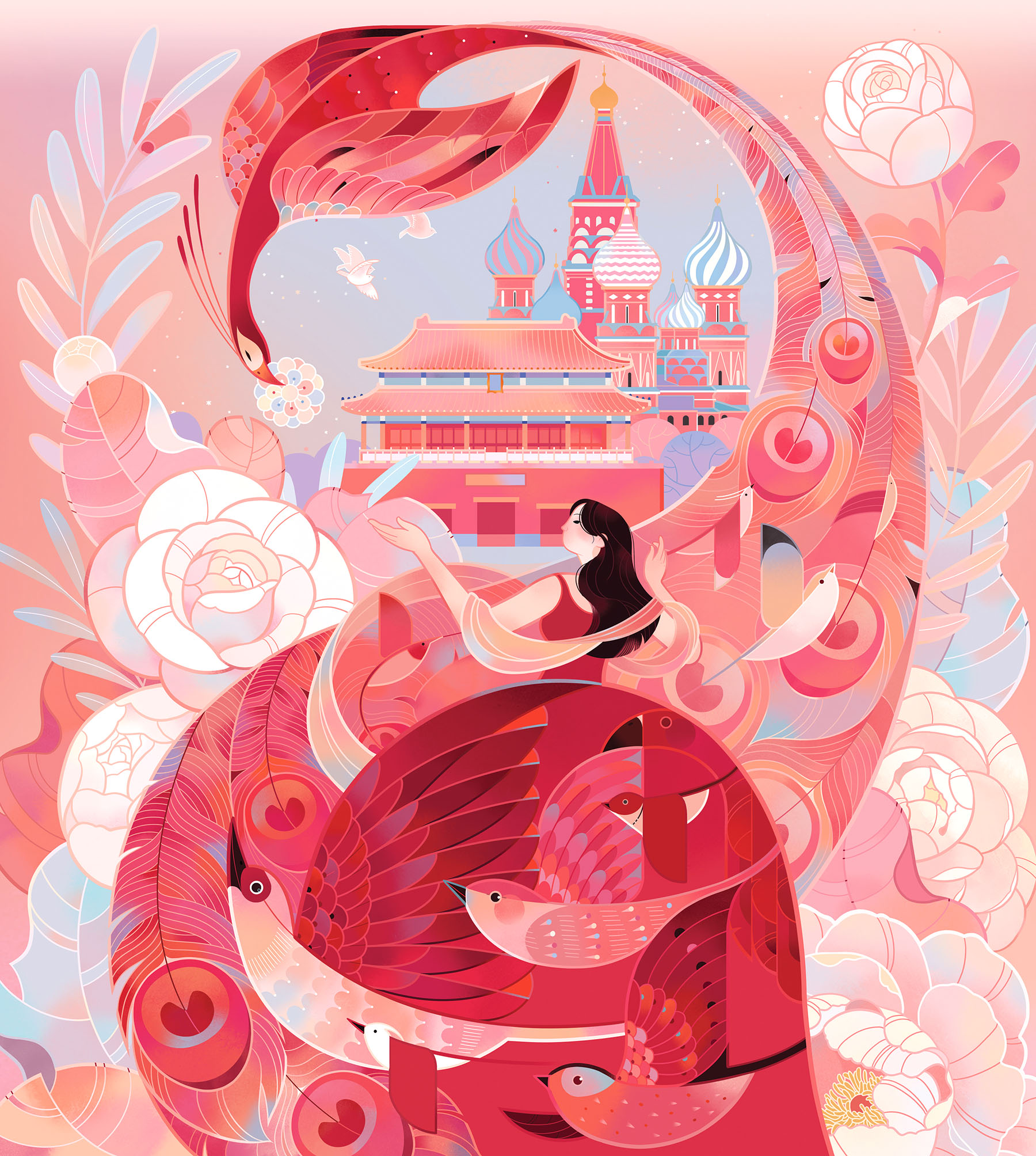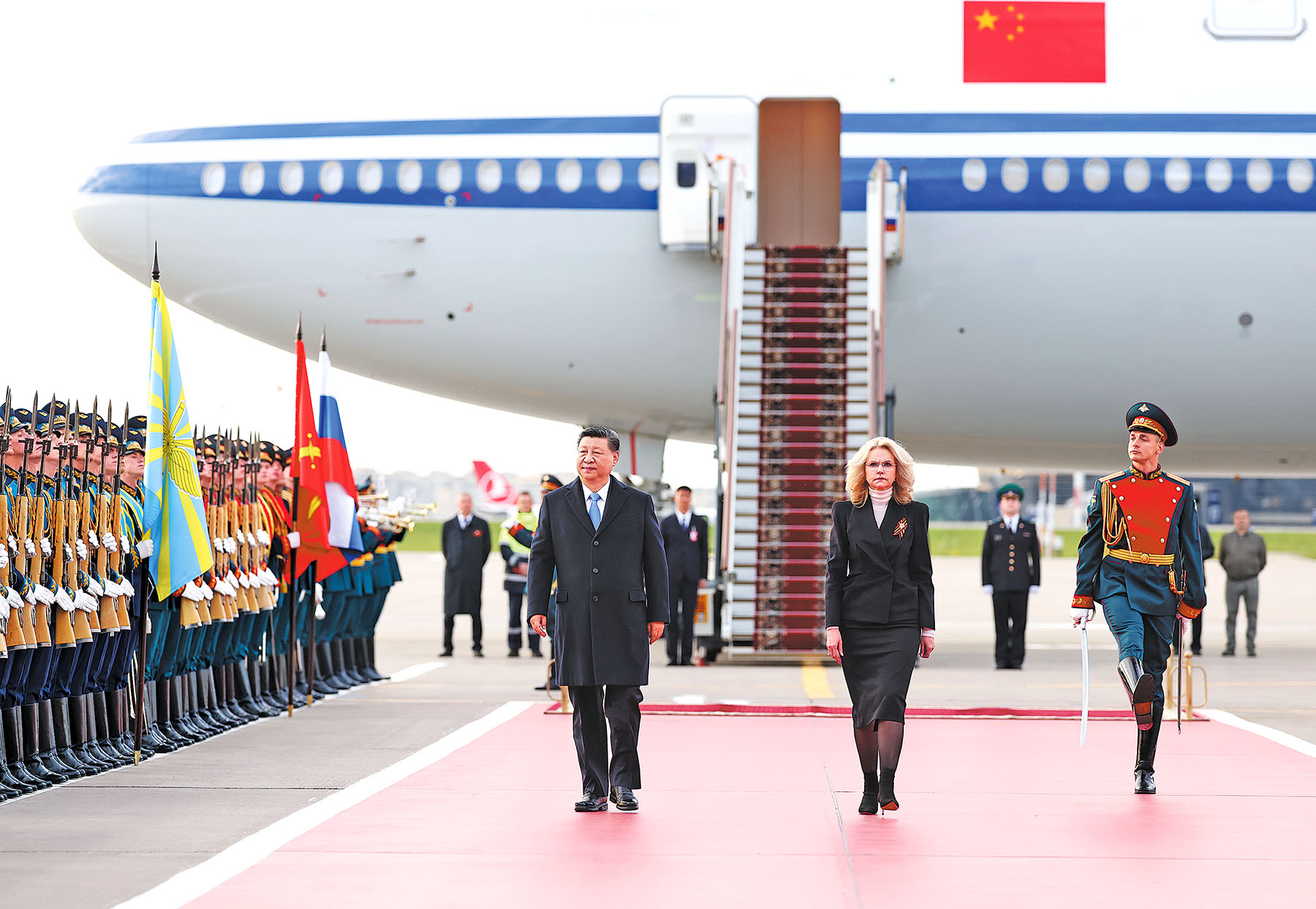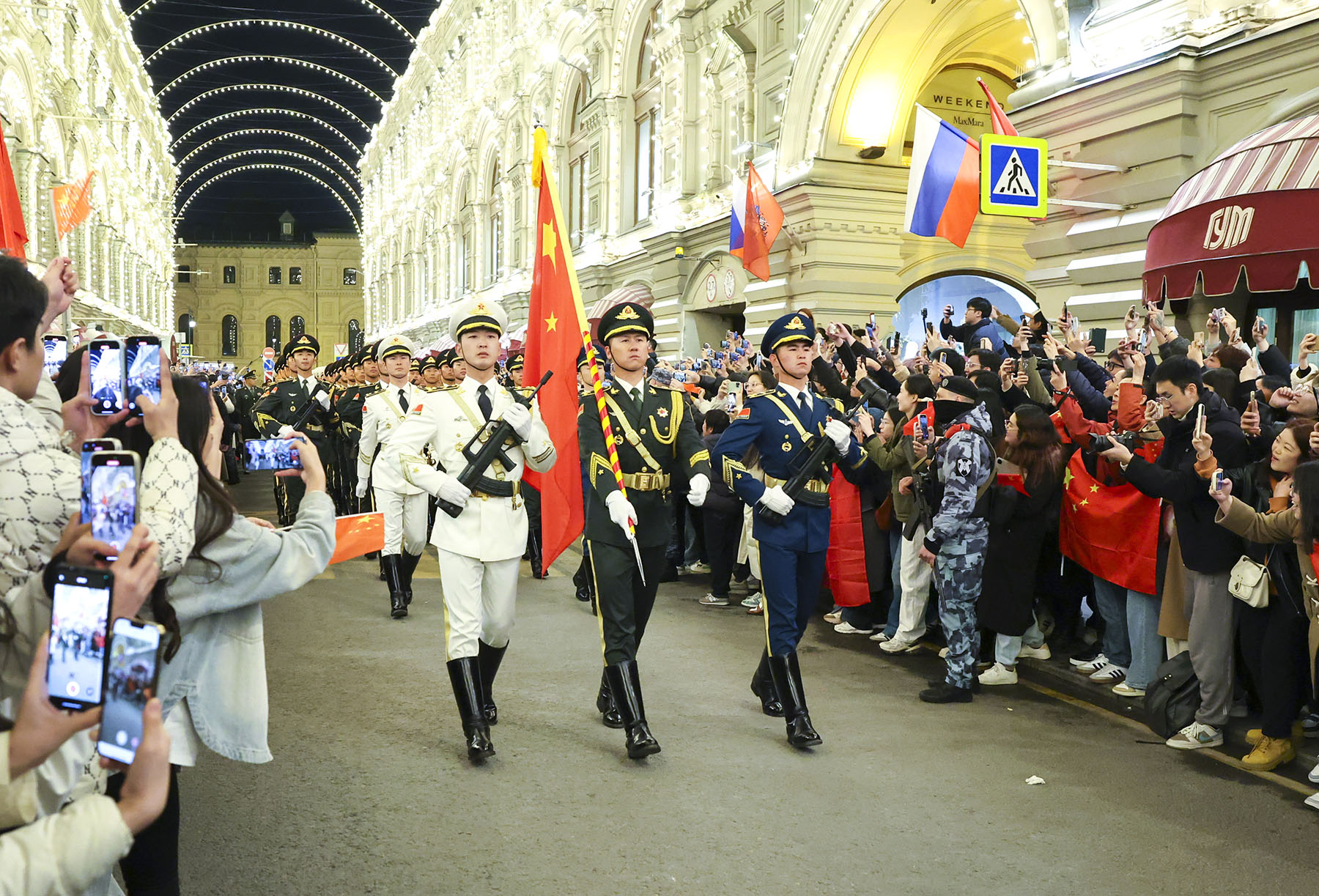Amid the 80th anniversary of victory of the Soviet Union’s Great Patriotic War, Xi urges heeding lessons of history

President Xi Jinping has called on the world to draw wisdom and strength from the lessons of World War II, “resolutely resist all forms of hegemonism and power politics” and “work together to build a brighter future for humanity”.
Xi made the remarks in an article published by the Russian Gazette newspaper as he arrived in Moscow on May 7 for a state visit to Russia and celebrations marking the 80th anniversary of the victory in the Soviet Union’s Great Patriotic War.
The four-day tour marks Xi’s 11th trip to Russia since he became Chinese president. The heads of state of the two nations have met more than 40 times on different occasions over the years.
“Eighty years later today, however, unilateralism, hegemonism, bullying, and coercive practices are severely undermining our world. Again, humankind has come to a crossroads of unity or division, dialogue or confrontation, win-win cooperation or zero-sum games,” Xi wrote in his article.
In the published piece, he sent a stern warning to those who attempt to distort or overturn World War II history, reaffirmed Taiwan region’s return to China in 1945 as a key part of post-war international order, and called for practicing true multilateralism and securing the international rules and order.
“Eight decades later today, we must take all necessary measures to resolutely safeguard our sovereignty, security, and development interests. We should be guardians of historical memory, partners in national development and rejuvenation, and champions of global fairness and justice,” he said.
Urging the international community to uphold the correct view of the history of World War II, Xi noted that China and the Soviet Union stood as the backbone in the fight against Japanese militarism and German Nazism, making decisive contributions to the victory in the World Anti-Fascist War.
In the first part of his article, Xi recalled his meeting 10 years ago in Russia with 18 Russian veteran soldiers, who endured the blood and fire of battlefields during the Soviet Union’s Great Patriotic War and the Chinese People’s War of Resistance Against Japanese Aggression.
“Their unyielding resolve and indomitable bearing left an indelible impression on me,” Xi said, adding that all veterans — from generals to the rank and file — will always be remembered for their extraordinary service and heroic feats in securing the victory over fascists around the world.
This year also marks the 80th anniversary of the restoration of Taiwan.

Xi named a series of documents with international legal effect, including the Cairo Declaration and the Potsdam Proclamation, as these landmark documents confirmed China’s sovereignty over the Taiwan region.
“No matter how the situation on the Taiwan Island evolves or what troubles external forces may make, the historical trend toward China’s ultimate and inevitable reunification is unstoppable,” Xi said.
He said that Beijing highly commends that Russia has repeatedly reaffirmed its commitment to the one-China principle.
Speaking of China-Russia ties, Xi called on both nations to jointly reject any attempts that aim to sow discord in their friendship and mutual trust.
Also, the two countries “should not be distracted by fleeting clouds, or disturbed by high winds and rough waves of events”, he said.
He identified both countries as “major countries with significant influence in the world”, and “constructive forces for maintaining global strategic stability and for improving global governance”.
The bilateral relationship is “neither directed against nor swayed by any third party”, he said, noting that the ties have a clear historical logic, a powerful internal driver, and profound cultural heritage.
Xi urged the two sides to jointly promote the process of world multi-polarization and jointly promote the building of a community with a shared future for mankind with the certainty and resilience of China-Russia strategic coordination.
Officials and scholars said that no matter how the international situation changes, the momentum of China and Russia’s commitment to friendship will remain constant and dynamic.
As a sign of the high level of bilateral relations, the two countries have publicly exchanged support for one another in organizing events marking the anniversaries when they spoke about their bilateral agenda for this year.
At a meeting with Chinese Foreign Minister Wang Yi in Moscow on April 1, Russian President Vladimir Putin said that he “looks forward to the Chinese side coming to Russia to attend commemorative events”, and that the two nations should continue to send strong signals to the world on strengthening strategic collaboration in the face of the volatile international situation.

Chinese Ambassador to Russia Zhang Hanhui said the two countries “join hands to defend the victorious outcome of World War II, jointly advocate international justice, and safeguard the post-war international order as well as the central role of the United Nations in the international system”.
“During this year, important high-level contacts between China and Russia will once again write a new chapter in the bilateral relationship,” he told Russian media on April 21.
Analysts noted that in recent years the two countries have strengthened political mutual trust, continuously deepened pragmatic cooperation, and witnessed people-to-people cooperation and closer collaboration in the international arena.
Wang Wen, dean of Renmin University of China’s Chongyang Institute for Financial Studies, noted that President Putin has made it clear that the development of relations with China is a strategic choice made by the Russian side with a long-term perspective, is by no means a tactical move, and is not subject to the influence of a certain event or to the interference of external factors.
“We also need to basically have strategic confidence in China-Russia relations,” Wang Wen said.
As part of the two countries’ frequent high-level exchanges, Chinese Vice-Premier Ding Xuexiang met with Russian Deputy Prime Minister Alexey Overchuk in Boao, Hainan province, in March, and with Russian Minister of Energy Sergei Tsivilev in Beijing last month.
Foreign Minister Wang told Russia Today in an interview last month that, “For such major countries and neighbors with global influence as China and Russia, neither alliance nor confrontation is in the fundamental and long-term interests of the two countries and their peoples.”
Su Xiaohui, deputy director of the Department of American Studies at the China Institute of International Studies, noted that friendship for generations and never being an enemy to each other is “an important lesson that China and Russia have learned in their interactions over past decades”.
“The two sides are willing to carry on this consensus”, as it serves as a cornerstone for advancing the further development of relations between the two countries and “brings more certainty to regional security and world peace”, she said.
Su also noted that “the world is glad to see that the two major countries are able to maintain communication, avoid miscalculation, strengthen cooperation, and share responsibility”.
Last year, the annual trade between the two countries reached $244.8 billion, up 1.9 percent year-on-year.
China has remained Russia’s top trade partner for 15 consecutive years, according to the Chinese Foreign Ministry.
The two sides are making solid progress in cooperation in fields including the economy, trade, investment, energy, and aerospace and they are expanding cooperation in emerging fields such as the digital economy, e-commerce, biomedicine, and science and technology innovation, observers noted.
“China is willing to continue contributing to the development of the world economy with Russia,” Xiang Bo, Chinese consul-general in the Russian city of Kazan, said in an op-ed article published in Russian media on April 9.
He compared China-Russia cooperation to a high-speed train, saying that “while the scenery changes and the weather changes on the way, the direction of the train will not change, and the rhythm of its steady progress will not change”.
Feng Shaolei, director of the Center for Russian Studies at East China Normal University in Shanghai, said at a forum in March that “China and Russia both advocate independent and autonomous management of internal and external relations, and the relationship between the two countries is the mainstay of the world’s transformation”.
Li Hai, Chinese consul-general in Russia’s Irkutsk city, wrote in a March article that both countries are major countries in science and technology, and that they “should firmly advocate global scientific and technological cooperation and fair competition, and oppose technological blockade and scientific and technological bullying”.
zhangyunbi@chinadaily.com.cn


